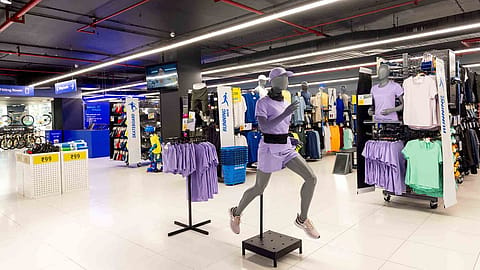World Environment Day: Decathlon India bets big on circular economy with 200% growth target for second-life products
Through initiatives like product repair, resale, and buyback, the company aims to extend the lifecycle of its sports gear while making sustainability central to how it designs, delivers, and reclaims its products.

In a significant shift from the traditional retail model, Decathlon India is embedding circularity into its core operations—making it the first sports retailer in the country to do so at scale. Decathlon's plan is to triple its circular turnover by 2027, targeting a 200% growth over 2024 levels.
Through initiatives like product repair, resale, and buyback, the company aims to extend the lifecycle of its sports gear while making sustainability central to how it designs, delivers, and reclaims its products.
The company’s new model, launched this week, aligns with India's push towards a circular economy and the government’s Mission LiFE (Lifestyle for Environment) framework.
This transition will not just be a one-off campaign. The company has embedded circularity into three core retail services: repair stations in over 95 stores, resale of refurbished products in 90+ outlets, and a buyback programme for used sports equipment currently available at 50 stores, with plans to scale further and go online. Together, these services are expected to divert over 300,000 sports products from landfills by 2027, significantly lowering the brand’s environmental footprint.
Sankar Chatterjee, CEO, Decathlon India, said the company’s approach is rooted in making sustainability affordable and accessible. “We have always believed that accessibility and sustainability must go hand in hand,” he said. “As our customers evolve, so must our responsibility to offer high-quality, long-lasting products that reduce environmental impact and also address affordability.”
Timed around World Environment Day, the campaign—called the “Second Life Bazaar”—is part of Decathlon’s broader sustainability playbook. The global sports retailer aims to achieve net-zero greenhouse gas emissions by 2050, with an interim target of cutting absolute CO₂ emissions by 42% by 2030. Its global decarbonisation strategy includes reducing single-use plastics, designing repair-friendly gear, and introducing more second-life product options across markets.
Annie George, leader of Sustainable Development at Decathlon India, said this wasn’t just a one-time shift but a complete rethinking of how sport is consumed and made accessible. “As a brand deeply rooted in purpose, we have always believed that sustainability must be built into the way we design, deliver and take back our products,” she said. “It’s not just about reducing environmental impact; it’s about reshaping how people access sport in a more responsible way.”
Recommended Stories
The circular model isn’t entirely new for Decathlon. It has already been rolled out in countries like France, Spain, Italy, Portugal, the UK, and Poland, where it has gained operational maturity in repairs and resale. The India rollout is expected to mirror that trajectory over time, especially with the country witnessing increased awareness around circular consumption and growing interest in affordable alternatives.
With 133 stores in India and over 1,750 globally, Decathlon’s India operations are now poised to become a testbed for scaling circular retail across other emerging markets. "With India moving towards a circular economy, our focus is on creating real, scalable solutions - from designing for durability to enabling easy repairs and buybacks," added George. The company sees this shift not just as a sustainability mandate but also as a practical business strategy to make the domain of sports more inclusive, reduce costs for consumers, and minimise waste.